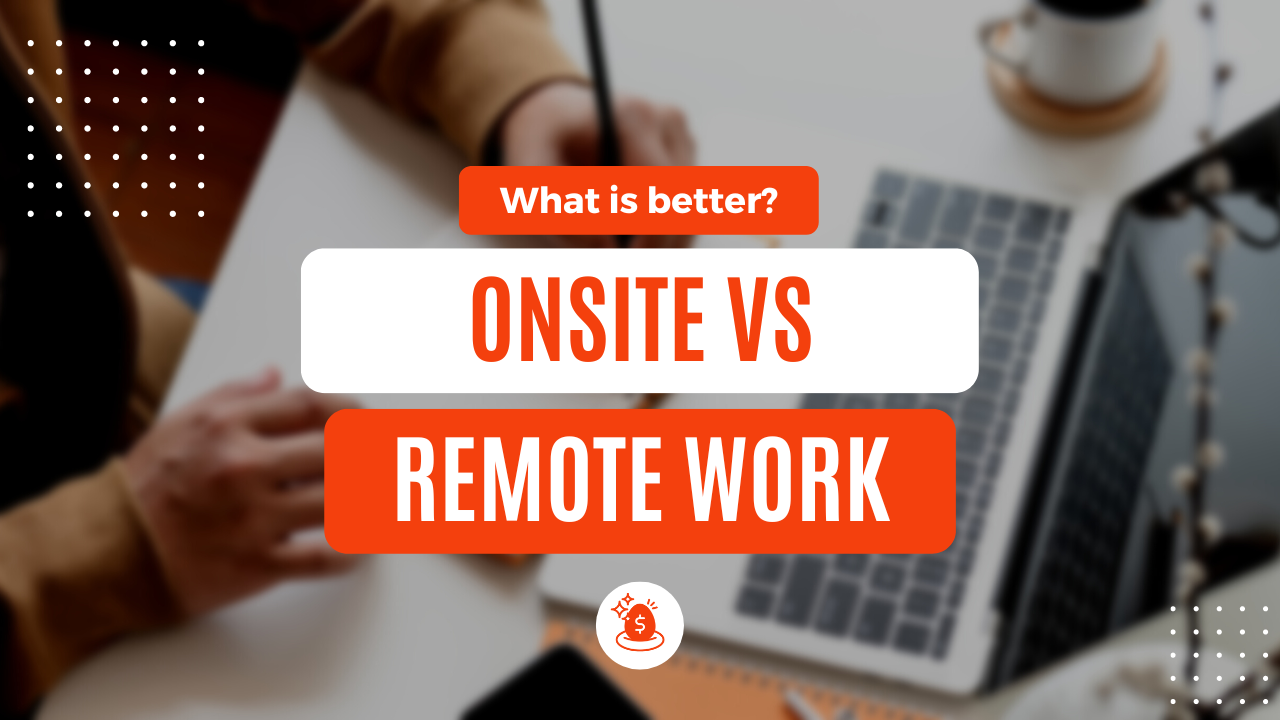In recent years, the debate over whether it’s better to work remotely or onsite has become super relevant. A recent study found that 48% of people would leave a job if it stopped them from ‘enjoying life’. Remote work can offer a lot of flexibility and comfort, but can also lead to isolation and teamwork challenges. By contrast, working onsite helps collaboration and may enhance team spirit, but it often requires commuting and can increase distraction.
Your ideal work environment is shaped by your individual needs, and influenced by personal responsibilities, career goals, and lifestyle preferences. For those craving work-life balance and the ability to work from anywhere, I would recommend a remote role. On the other hand, if you thrive in structured settings with face-to-face interactions, then find onsite work.
In this article, I break down my thoughts, through experience, on the pros and cons of remote work vs onsite.
Key Takeaways
- Deciding between remote and onsite work requires reflecting on personal preferences and professional needs.
- Remote work provides flexibility but can pose challenges for communication and collaboration.
- Onsite work boosts interaction but may not offer the same level of work-life balance as remote positions.
Analyzing Work Environments
When looking at work environments, it’s vital to weigh the pros and cons of onsite and remote work, considering their impact on your personal life and helping you navigate the options available.
Pros and Cons of Onsite Work
Pros:
- Team Building: For me, onsite work helps relationship building and strong collaboration when brainstorming for work projects.
- Structure: It provides a more organized approach to meeting schedules, which can enhance time management.
Cons:
- Commuting: When commuting to the office, I spend around 45 minutes in the car each way. It costs more and can be extremely mentally draining. (this depends on your distance to the office of course).
- Rigidity: Working from the office offers limited flexibility compared to remote work, impacting work-life balance, particularly for those living with family or friends.
Pros and Cons of Remote Work
Pros:
- Flexibility: Remote working allows a flexible work environment, such as spending more time with your family, and working around home-based errands.
- Savings: Working from home can save on both commute expenses and mental health strain.
Cons:
- Isolation: Being fully remote can lead to feelings of isolation and disconnection from team members.
- Distractions: Home environments may have more tempting comfort distractions.
Impact on Personal Life
- Work-Life Integration: In my experience, work-life integration means finding a seamless balance. Whether I’m at the office or working remotely, it’s about ensuring that tasks are completed efficiently, fitting into my schedule in a way that promotes harmony between work and home.
- Cost of Living: Cost consideration is a huge factor in deciding to work in a remote job vs onsite, such as whether living closer to an office justifies the expense.
Considerations for Employees
- Nature of Work: Factor in the type of work you do and determine if it can be managed remotely or if being in an office is more suitable for your skillset.
- Benefits: Weigh the benefits of working on-site, like deeper human connections, against the benefits of remote work, like flexible hours and commute time.
Making an Informed Decision
If I was looking for a new role now, and determining whether to work onsite or remotely, I would consider several key factors such as my personal life, the flexibility I need, and the cost of living in my area.
Evaluating Work Options
I always start by examining the work options available to me. Each option offers different benefits: onsite work typically provides me with a structured environment with direct access to colleagues and resources, which enhances relationships and improves work collaboration. On the other hand, a remote job affords me the flexibility to set up my workspace at home, allowing for greater control of my working environment, a reduction in commute time, and more time with my family.
Adapting to the Cost of Living
Working remotely can significantly help with finances, particularly in terms of the cost of living. For example, I moved to the San Franciso Bay area and have been able to move further out from the city, resulting in cheaper rental prices and more space.
Here are some comparisons outlining the costs and savings associated with both scenarios.
| Expense Category | Onsite Work | Remote Work |
|---|---|---|
| Commuting | $$$ | $ |
| Clothing | $$ | $ |
| Food | $$$ | $$ |
| Housing | $$$$ | $$$ |
Ensuring Work-Life Balance
For me, work-life balance is the key problem that I look to solve when deciding if it is better to work onsite or remotely. If I choose to work onsite, I have to deal with the daily commute, which encroaches upon my time. In contrast, working from home typically offers me a more flexible work schedule, making it easier to blend professional and personal responsibilities. However, it’s essential to keep in mind that too much flexibility can sometimes blur the lines between work and personal life, so discipline and boundaries are key to maintaining balance.

